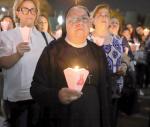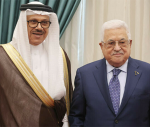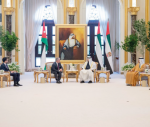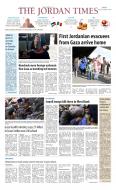You are here
Ukraine has options left — all bad
By AFP - Nov 03,2014 - Last updated at Nov 03,2014
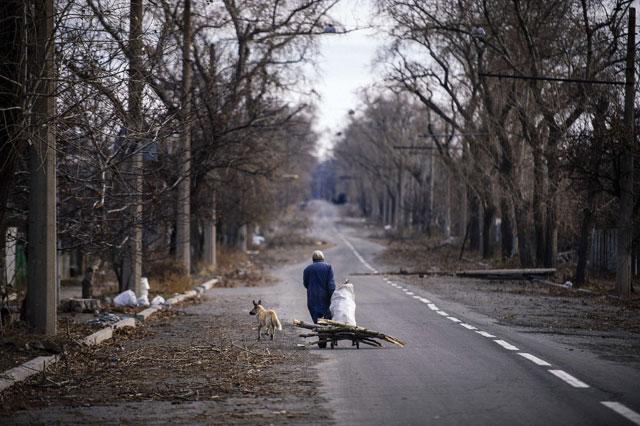
KIEV — Ukraine's government still has options after separatist elections showed its helplessness against a Russian-backed rebellion. The problem: they're all bad.
Analysts and officials paint a grim scenario facing Ukraine's pro-Western government as it ponders how to respond to the separatists' tightening grip on the industrial south-eastern Donbass region.
Sunday's leadership elections — approved by Moscow despite intense Western pressure — were only the latest addition to a growing sense that rebel areas have slipped near permanently from Kiev's control.
Recapturing rebel-held cities in Donbass like Donetsk and Lugansk is widely accepted to be beyond the small Ukrainian military's capabilities. The rebels are no rag-tag force, boasting units that resemble a heavily armed, regular army — even if Moscow denies Western allegations that those units are in fact Russian soldiers.
Another region, Crimea, was annexed by Russia in March and is home to large contingents of Russian troops, making it even harder to recover for Ukraine.
Fight or surrender?
Not many Ukrainians are ready for all-out war, says Glib Vyshlinsky, deputy director of GfK Ukraine marketing company in Kiev.
"If you're talking about fighting, with thousands of casualties being lost in order to win back these regions, then there is not support. Ukrainians are not such an imperial people as Russians and consensus will be against this," he said.
The opposite, radical approach would be for Ukraine to wash its hands entirely of the pro-Russian territories.
It's an option heard in private and aired online, such as on political analyst Yuriy Romanenko's Facebook page under a hashtag that translates as "stop feeding Donbass".
The idea would be that the communist-leaning eastern region should be allowed to join Russia, as the rebels say they want to eventually. Ukraine would then be freed from the huge costs associated with the war-ravaged region and be left to pursue its other main challenge of instituting pro-Western economic and legal reforms.
"No worries," comments Tatyana Filatova under Romanenko's latest post about the separatist elections. "Now we can go to Europe."
Only a "narrow segment of society" favours simply turning its back on the problem, Vyshlinksy said.
A GfK poll in September showed that 31 per cent support a "bad peace", including giving up some territory to Russia. Fifty-four per cent were for fighting on.
One concrete sign that Ukraine's government is preparing to sever at least some ties with the east is the suggestion from top ranking officials in recent days that gas supplies may be ended to rebel territories — which would turn to Russia for help.
"Those announcements are trial balloons to test Russia," said Taras Berezovets, head of Berta Communications in Kiev.
"Russia doesn't want to have to pay for Donbass."
Frozen conflict?
"We cannot give up Donbass," a top security official, who asked to remain anonymous, told AFP. "We will do everything we can to restore our sovereignty on this territory, but for now we can't do it."
Put like that, it appears that Ukraine could be looking at another of the so-called "frozen conflicts" plaguing this geopolitical neighbourhood.
Russian-supported rebels control Abkhazia and South Ossetia in Georgia, while other Moscow-backed separatists rule Moldova's territory of Transdniestr.
Those countries' experience shows that the only positive side of freezing a conflict is that fighting dies down to a minimum.
But in both cases, the conflicts have become drags on attempts to enact reforms required for getting into the European Union and other Western institutions. And even after more than a decade, there is no sign of the rebel territories returning to their original owners.
"Kiev has lost control over Donbass for a minimum of five years," Berezovets, the analyst, said.
"The authorities have long ago realised this. They have no illusions. But to admit this de jure would be political suicide. Everyone understands what a painful subject this is for people," he said.
Or hot war?
Ukrainians' worst fear, though, is that the separatists and their Russian backers may want a hot, not frozen war.
Rebel leaders talk openly of planning to extend their territory to the Black Sea port of Mariupol. Ukrainian security officials and soldiers believe Russia — or its proxies — could ultimately seize control of the whole coastline in order to establish a land link with its newly conquered region of Crimea.
Without that land link, Crimeans face a long, cold winter relying on sea routes from Russia for supplies, unless, that is, the estranged government in Ukraine comes to their aid.
"A lot will depend on whether Kiev and Moscow can make an agreement on supplies to Crimea, which is in a hard situation now," the security official said.
"If there is a deal, then there won't be a big offensive before the spring. They won't do it in winter," the official said. "If there's no deal, though, and we try to cut off Crimea, then they won't have any other option and they will push ahead."
Many questions, few easy answers.
"If there is a plan," a senior foreign ministry official told AFP, "then it's only known to a small circle of people in the presidential adminstration".
Related Articles
When Igor Romanenko's friend suggested heading to a gathering on Kiev's Independence Square a year ago Friday, he had no idea he was about to witness the birth of a movement that would change his country forever.
Ukraine ratified a sweeping agreement with the European Union on Tuesday — an issue at the heart of the Russia-West crisis over its future — and sought to blunt the independence drive of Russian-backed separatists by offering them temporary and limited self-rule.
Two wounded Russian soldiers captured while fighting in war-torn eastern Ukraine have been transferred to a hospital in Kiev, Ukrainian officials said Monday as Moscow once again firmly denied any involvement in the fighting.
Opinion
Nov 03, 2023
Nov 03, 2023
Nov 01, 2023
- Popular
- Rated
- Commented
Nov 03, 2023
Nov 03, 2023
Nov 01, 2023
Newsletter
Get top stories and blog posts emailed to you each day.






